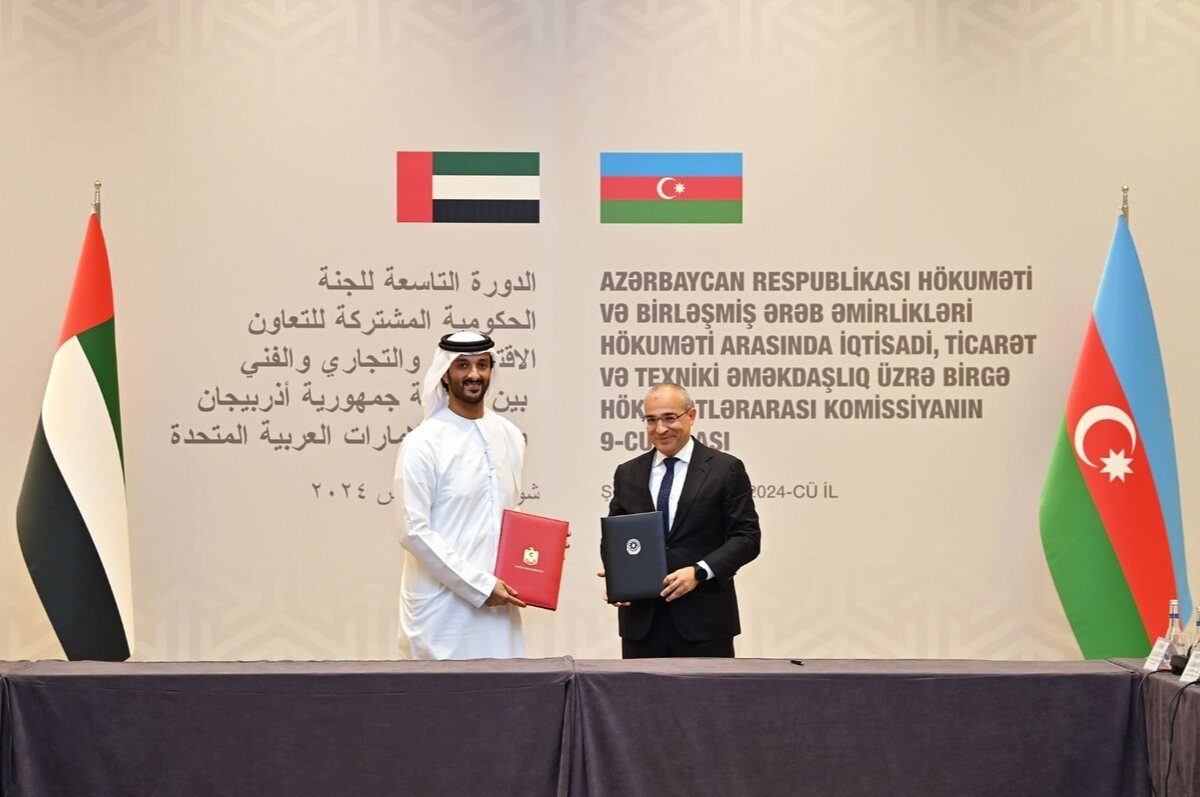The ninth session of the UAE-Azerbaijan Joint Intergovernmental Commission (JIC) for Economic, Trade and Technical Cooperation between the two countries was held in the Azerbaijani city of Shusha, chaired by Abdullah bin Touq Al Marri, Minister of Economy; and his Azerbaijani counterpart Mikayil Jabbarov. The session was attended by several senior officials and government and private sector representatives from both sides.
Strengthening economic partnerships
During the meeting, the UAE and Azerbaijan agreed to develop their existing economic partnership in the sectors of entrepreneurship, SMEs, new economy, tourism, aviation, industry, innovation, technology, agriculture, food security, logistics, culture, energy, renewable energy and investment.
Long-standing strategic relations
Bin Touq stated that the UAE and Azerbaijan share strong strategic relations and economic partnerships that have evolved over more than three decades. These relations are characterised by the frequent exchange of high-level visits between the two countries. The most recent of them was the visit of President His Highness Sheikh Mohamed bin Zayed Al Nahyan to Azerbaijan last January, during which, MoUs were signed between the two countries in areas of mutual interest.
Advantages of UAE’s business environment
During the meeting, Bin Touq reviewed the opportunities and advantages offered by the UAE’s business environment, most notably the amendments made to the Commercial Companies Law to allow 100 percent foreign ownership. The amendment led to the registration of more than 275,000 new companies in the UAE within a year and a half. Thus, the total number of companies operating in the UAE exceeded 788,000 by the end of 2023. In addition to this, visa and residency systems were revamped, and self-employment and green residency routes were introduced, thereby promoting the country’s attractiveness to talents, competencies, and entrepreneurs in various strategic sectors.
Promoting UAE’s flexible business climate
Bin Touq urged the Azerbaijani private sector to capitalise on the flexible and competitive policies offered by the UAE’s business environment, which facilitate the establishment and launch of new ventures. He noted that the recent updates made to various legislations, including the family businesses law, commercial agencies, cooperatives, and trade through modern technology means, have contributed to ensuring a more supportive business climate. Furthermore, he emphasised the UAE’s commitment to driving sustainable economic growth through promoting a circular economy, particularly highlighting the ‘UAE Circular Economy Agenda 2031.’
Read more: Abu Dhabi’s Masdar, Azerbaijan sign 1GW renewables deal
Enhancing economic collaboration
Both parties agreed to establish joint work teams consisting of members from relevant entities from both sides to explore further opportunities for economic collaboration in priority sectors at both government and private sector levels. They will also provide comprehensive support for exporters and importers to facilitate and enhance the exchange of goods and services, as well as to diversify them.
Boosting startup growth
The UAE and Azerbaijan explored the potential for implementing tailored programs and initiatives to boost the growth of startups in both markets. The discussions focused on enhancing investment opportunities and enabling exports to access new markets. The two sides agreed on the importance of motivating SME owners and entrepreneurs to invest in new economy sectors, thereby increasing their contributions to the GDP of both nations.
Collaboration in tourism, digitalization, and agriculture
The UAE and Azerbaijan expressed their interest in organising joint tourism exhibitions, events, and conferences to highlight the key tourism and historical attractions of both countries and to leverage their diverse tourism offerings. Both parties discussed ways to strengthen collaboration in the areas of digitalisation, innovation, and technology. The two sides also reviewed the latest trends in the agricultural sector and explored the means to strengthen cooperation in food security and agriculture.
Energy and renewable energy cooperation
The strengthening of cooperation and investment exchanges in the energy and renewable energy sectors was another major area of focus. The JIC session further explored prospects for partnerships to launch new projects, particularly in power generation, and for organising workshops for experts from both countries on energy efficiency improvement.
Growing trade and investment
The UAE is Azerbaijan’s number one trading partner in the Arab world, accounting for 40 percent of its trade with the region. In 2023, the value of non-oil trade between the two countries surpassed $1.64 billion, reflecting an impressive growth of 68 percent compared to that of 2022. Preliminary figures also suggest a rise in non-oil trade between the two countries during the period from January to April 2024, which has reached $617 million, reflecting a 62 percent growth compared to the same period in 2023. The UAE’s investments in Azerbaijan are estimated at $1.1 billion by the end of 2022, which makes the UAE the largest Arab and seventh largest global investor in Azerbaijan. Meanwhile, Azerbaijani investments in the UAE amounted to over $210 million as of the end of 2021.
For more economy news, click here.








